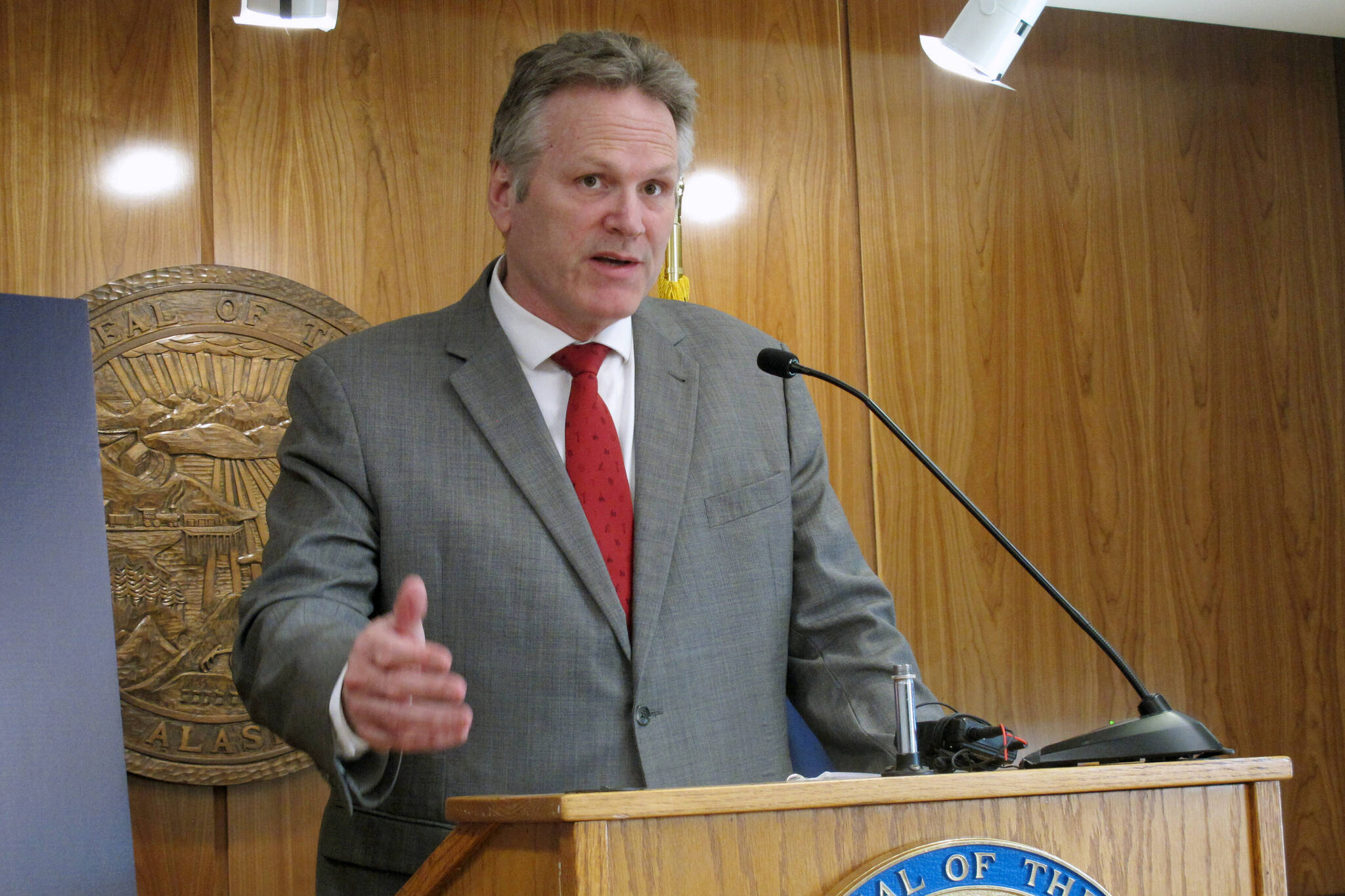Speaking from the Alaska State Capitol, Gov. Mike Dunleavy on Thursday laid out what he wants state lawmakers to prioritize as the current legislative session winds down.
Dunleavy pushed legislators to focus on finalizing the amount Alaskans will receive through the Alaska Permanent Fund dividend, putting surplus revenue into savings and passing his public safety bills.
Citing a projected multibillion dollar surplus in state revenue this year, Dunleavy reiterated his ask for a $3,700 PFD. He first teased the idea of a $3,700 PFD in March, when a spike in oil prices caused state revenue forecasts to jump. Dunleavy said then that even with $3,700 PFD payments, which includes a retroactive dividend payment from 2021 and a 2022 payment under his fifty-fifty plan, the state would still see a surplus of about $3.4 billion.
“Given that we’re looking at … a surplus, and that Alaskans are struggling — as the rest of America is — we see real opportunity here to do some good things for the people of Alaska in making sure that we get as large a PFD as possible,” Dunleavy said.
Dunleavy said he and legislators seem to agree that it’s a good idea for the state to save some of its surplus money given the volatility of oil prices and general uncertainty worldwide about things like supply chains and inflation.
Dunleavy said he wants to see his victim’s rights bill get a hearing in the Legislature and thinks “something will come out of both (legislative) bodies” related to his human trafficking and sex offenses bills. All three pieces of legislation are part of Dunleavy’s “People First Initiative,” which is intended to address public safety issues such as missing and murdered Indigenous persons, foster care and homelessness.
“We are working with legislators on this to make sure that whatever comes out is as close as possible … to the bills that we introduced for the purpose of making sure that we protect our most vulnerable.
All of those priorities are in addition to legislation that aims to boost educational outcomes among Alaska students, including bills that local education leaders are keeping an eye on.
The Kenai Peninsula Borough School District has identified House Bills 272 and 273 as being important to them this session. Both bills address the amount of money the State of Alaska gives school districts per student. That amount, called the Base Student Allocation, or BSA, hasn’t changed since 2017 and is determined by a state tool called the Foundation Funding Formula.
House Bill 272 would increase the Base Student Allocation from $5,930 — the current level — to $6,208 over the next two years. House Bill 273 would annually increase the allocation through adjustments for inflation.
KPBSD Superintendent Clayton Holland has said that the additional funding those bills would provide will be important in light of the district’s projected budget deficits. The district is projecting a status-quo budget deficit of about $7 million for the upcoming fiscal year, which begins on July 1, 2022, and ends on June 30, 2023. Continued deficits are projected for future fiscal years, according to the district.
Skeptics of increasing funding for education have said that any additional funding should be tied to better educational outcomes.
One of the proposed ways to boost outcomes is Senate Bill 111, also called the “Alaska Reads Act.” As reported by the Juneau Empire, the bill would create three-year grants for school districts to establish pre-K programs, establish a screening and intervention process for students’ reading skills and offer additional financial support to struggling districts.
Dunleavy said Thursday that he is “optimistic” that SB 111 will pass, but, if it doesn’t, that there will be “a serious conversation” about why more money should be put toward education.
“My expectation is that the reading bill passes without any changes,” Dunleavy said. “If there is no reading bill and there’s just an ask for more money, I think there’s going to be a serious conversation about why just giving money makes sense.”
Dunleavy’s full press conference can be streamed on the governor’s Facebook page.
Reach reporter Ashlyn O’Hara at ashlyn.ohara@peninsulaclarion.com.

